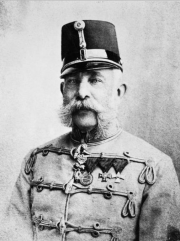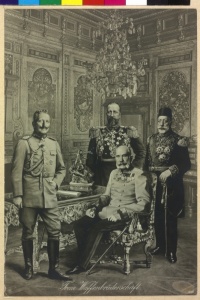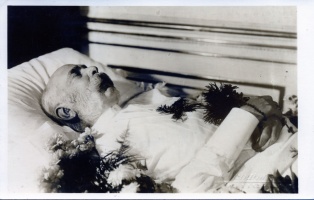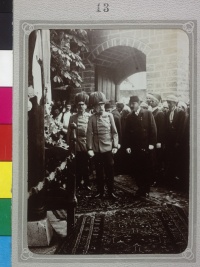Early Foreign Policy↑
Francis Joseph I, Emperor of Austria (1830-1916) experienced his share of war during the early years of his reign. During the revolutionary upheavals of 1848, he served for a few weeks with Josef Graf Radetzky’s (1766-1856) army in Italy and took part in the campaign against Hungary, famously entering Györ over a wooden bridge still smoldering with fire. In 1859, he authorized an ultimatum against Piedmont; in 1866 he risked war against Prussia. Both times the appeal to arms backfired. These defeats also cost him absolute power domestically. External defeats spelt internal reforms. Austria was turned into Austria-Hungary in 1867 and “neo-absolutism” into constitutional monarchy, with the trend towards parliamentary government gaining speed in Hungary, but being stopped in its tracks in Austria after the 1890s. However, since 1867, foreign policy and army administration were subject to scrutiny by a toothless parliamentary substitute, the so-called delegations, committees of both the Austrian and Hungarian parliaments, with a heavy dose of members from the House of Lords. While delegating routine administration to the governments in Vienna and Budapest, Francis Joseph thus managed to defend his prerogatives in terms of foreign policy and army command.
An Empire at Risk↑
In matters of foreign policy, Francis Joseph joined Germany in the Dual Alliance of 1879 and concluded less solid treaties with Italy (1882) and Romania (1883). Austria-Hungary did not take part in the scramble for Africa (or any other part of the world). It benefited from the classic age of imperialism, in which attention was centered on parts of the world where Austrian interests were not at stake. This blissful state of affairs ceased as soon as the survival of the Ottoman Empire was endangered. As a multinational empire, Austria-Hungary was surrounded by irredentist movements on all sides. German and Italian irredentism was contained by alliances with their potential sponsors; Poles and Ukrainians generally preferred Austrian rule to Russian despotism; Czechs and Slovaks, for the time being, had nowhere else to turn. Romanians and Serbs, however, were attracted by the economically more backward, but politically independent nation-states that had won their freedom from Ottoman rule during the 19th century.
The dangers of Southern Slav irredentism may have been exaggerated by the alarmism of war hawks within the Austrian leadership; after all, Croats, Serbs and Bosnian Muslims, with all their differences, comprised only six out of the empire’s 54 million inhabitants. Moreover, in 1913, a government-sponsored party easily won most of the Serbian seats in the Bosnian diet. Yet, the growing power of an increasingly assertive Serbian “Piedmont” after the Balkan Wars of 1912-1913 worried the monarchy leadership. In the event of a war with Russia, Austria-Hungary now faced the prospect of having to fight on a second front in the south. Hopes that Bulgaria might crush the Serbs had been dashed by the Second Balkan War; even worse, the events of 1912-13 had seriously undermined Austria-Hungary’s Romanian alliance. Austria had issued ultimatums several times and mobilized troops during the Balkan Wars at a financial cost it could ill afford. Formally, it had achieved its aims (Montenegro’s withdrawal from Skutari and Serbia’s withdrawal from Albania), but it had been unable to prevent Serbia’s expansion.
A Costly Ultimatum↑
After the last such ultimatum in October 1913, Francis Joseph expressed his frustration over such pyrrhic victories when he let it be known: there should be no more such mobilization short of war. The next time a crisis threatened in the Balkans, Austria would either have to look the other way – or go to war. Thus, it cannot come as a big surprise that the emperor opted for war in July 1914. If it had not been for the crises of the last two years, Austria-Hungary might have been content with a face-saving diplomatic solution. But coming on top of the recurrent alarms of the first two Balkan Wars, the assassination of the heir-apparent was simply a challenge Austria could hardly ignore. The emperor certainly agreed with Leopold Berchtold’s (1863-1942) policy during the July 1914 crisis; he was neither tricked into signing the ultimatum nor able to comprehend what he was doing. He had for the first time suffered a serious illness in the spring of 1914, and looked his age of eighty-four. He was famous for his respect for departmental responsibilities and did not welcome outside advice. Much of modern fin-de-siècle life may have been incomprehensible to him; but he was certainly in charge of the bureaucratic structures to which he was used. Observers used to favorably compare his workaholic grasp of detail and alertness of mind with Wilhelm II, German Emperor’s (1859-1941) far-ranging declamations and vacillating mood swings.
Managing a War↑
Francis Joseph no longer commanded his armies in person but appointed his cousin Archduke Friedrich von Österreich-Teschen (1856-1936) as commander-in-chief. He served as a buffer between Franz Conrad von Hötzendorf (1852-1925) as chief-of-staff and the political world. In line with Berchtold’s thinking, who wanted to impress the Balkan states with Austria’s prowess, the emperor did intervene in September 1914 to retain a bigger share of the army on the Serbian front than Conrad wanted. However, he parted ways with Berchtold over the wisdom of appeasing Italy by cessions of Austrian territory. With hindsight, it seems Francis Joseph was right about the futility of all such endeavors: The Italians saw through the transient nature of Austrian offers. Once the Central Powers had won the war, the Austrians would be sorely tempted to launch a war of revenge against Italy.
Francis Joseph wanted none of such devious plots and counter-plots. In January 1915, he replaced Berchtold with the ponderous Baron Istvan Burian (1852-1922), who pursued a more intransigent line. He resented German lobbying to persuade the Austrians to enlarge their offers to the Italians. Such efforts did not even stop short of Katharina Schratt (1853-1940), Francis Joseph’s long-time confidant. It was in the spring of 1915 – and definitely not in the summer of 1914 – that Francis Joseph uttered the famous line that now the empire will at least go down honorably. He reluctantly agreed to open negotiations with Italy, after all, in late March of 1915, but was relieved when they foundered. He confided that it had been one of his happiest moments when Italy broke off the talks; it was as if a nightmare had been lifted from his shoulders.
In domestic politics, Francis Joseph appreciated Istvan Tisza’s (1861-1918) ability to harness Hungary’s resources for the war effort, whereas Austrian politicians deplored Tisza’s ascendancy, especially after food shortages created additional friction between the two halves of the empire. In the Austrian half of the monarchy, the emperor turned a blind eye to the military’s encroachments on civilian administration for a long time. He agreed to replace the governor of Bohemia in early 1915 and resented but did not overturn the military’s decision to arrest Karel Kramar (1860-1937) in May 1915. In October 1915, he seemed for a moment to bow to outside pressure and considered replacing Karl Graf Stürgkh (1859-1916) as prime minister, but finally decided against it.
Francis Joseph was a faithful adherent of the German alliance but complained about the opaque character of decision-making in Berlin and resented German attempts to turn the alliance into an ever deeper union, a “Mitteleuropa” that would constitutionally link the two empires (in return for turning Poland over to Austria). On the other hand, Francis Joseph had never been averse to creating a unified command on the Eastern Front, if only that would pave the way for greater German support against Russia. After the Brusilov Offensive in June 1916 had demonstrated the bankruptcy of Conrad von Hötzendorf’s go-it-alone strategy, he personally took a lead to establish the Ober Ost. When Conrad asked the officer presenting him with the unwelcome news that he had to answer to Paul von Hindenburg (1847-1934) in future, who had drafted such a criminal document, he was told: “His Majesty has personally dictated it to me.” Under the terms of the agreement, however, Francis Joseph did retain a power of veto over Hindenburg’s decisions.
Francis Joseph’s Final Months↑
In terms of foreign policy, there are indications that Francis Joseph started to get impatient with Burian, who failed to get on with Germany and had been wrong-footed by Romania’s entry into the war in September 1916. But contrary to rumors, there are no hints that – like his successor Charles I, Emperor of Austria (1887-1922) – he wanted to press for an early peace, even at the cost of Austrian concessions. It is an open question whether Francis Joseph was willing to use the wartime emergency to redraw Austria’s constitution. There are hints that he may well have been prepared to do so. However, when Stürgkh was assassinated on 21 October 1916, his replacement by his former mentor Ernest von Koerber (1850-1919) was tantamount to a business-as-usual approach that did not seem to envisage any far-reaching changes – except for one: Francis Joseph’s last important act of government was his support for the creation of an independent Poland on 5 November 1916, together with a promise of an enlarged measure of autonomy for Austrian Galicia. A week later, the emperor came down with pneumonia, famously insisting on working at his desk until a few hours before his death on 21 November 1916. One of the reports claimed his last words were, “Wake me tomorrow at 4 o’clock as usual.”
Conclusion↑
Francis Joseph’s record – during the second half of his reign, at least – was one of uninspired competence. He was no visionary and no reformer, but he was a safe pair of hands at the helm of an empire that he himself regarded as an anachronism. He was consistent to a fault. Once he had decided on war, he never looked back. His most amazing contribution to World War I politics was his willingness to risk a war with Italy rather than attempt to bribe her into continued neutrality. That was a gamble that paid off. Austria did not go down to defeat in 1915 as almost everyone had predicted. Thus, the emperor was unable to enjoy his empire’s last moment of glory, from Tarnow-Gorlice to the defeat of Serbia.
Lothar Höbelt, Universität Wien
Section Editor: Tamara Scheer
Selected Bibliography
- Führ, Christoph: Das k. u. k. Armeeoberkommando und die Innenpolitik in Österreich, 1914-1917, Graz; Vienna; Cologne 1968: Böhlau.
- Galántai, József: Austria-Hungary and the war. The October 1913 crisis. Prelude to July 1914, Studia historica Academiae Scientiarum Hungaricae, volume 2, Budapest 1980: Akadémiai Kiadó.
- Höbelt, Lothar: Franz Joseph I. Der Kaiser und sein Reich. Eine politische Geschichte, Vienna 2009: Böhlau.
- Höbelt, Lothar: Austria-Hungary and the Balkan Wars, 1912-13, in: Bled, Jean-Paul / Deschodt, Jean-Pierre (eds.): Les guerres balkaniques 1912-1913, Paris 2014: Presses de l'université Paris-Sorbonne, pp. 131-144.
- Komjáthy, Miklós (ed.): Protokolle des Gemeinsamen Ministerrates der Österreichisch-Ungarischen Monarchie (1914-1918), Budapest 1966: Akadémiai Kiadó.











